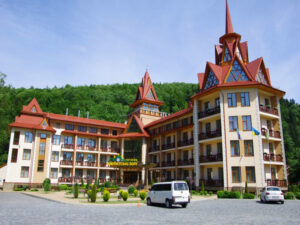
Ukrainian President Volodymyr Zelensky dismissed Ruslan Magomedov from his position as head of the National Securities and Stock Market Commission (NSSMC). The corresponding decree of the head of state No. 1018 of December 31 was published on his website.
Magomedov, who at the time was a freelance advisor to the head of the Office of the President (OP) and previously director of Astrum Capital, was appointed head of the NSSMC on February 23, 2021, replacing Timur Khromaev, whose term of office had expired along with three other members of the regulator.
In mid-December, Magomedov told Interfax-Ukraine that he would do everything possible to ensure that a law on personal investment accounts was passed before the end of his term of office on February 23, 2027, which, together with another idea to sell 7% of shares in state-owned companies and banks, would form the basis for a market reboot.
In October, Interfax-Ukraine reported on the resignation of NCSSM member Irakli Baramia and noted that the commission’s head had submitted a request for the dismissal of another member, Maxim Libanov, whose term of office had expired.
According to the publication Ekonomicheskaya Pravda, two other members of the NSSMC, Yuriy Boyko and Yaroslav Shlyakhov, submitted letters to President Volodymyr Zelenskyy in early December requesting their dismissal from their positions.
The adoption of a new law on the seventh member of the commission in 2024 has not yet affected its composition.
If all four members of the NSSMC are dismissed, it will lose its quorum. In addition, as one of the commission members told Interfax-Ukraine, a provision of the new law will come into force on January 1, 2026, according to which candidates will have to pass a selection committee before being nominated for appointment as a commission member, which may increase the time required for this personnel decision.
The NSSMC, as a collegial body, consists of a chairman and seven commission members (six members before the new law was adopted in February), who are appointed by the President of Ukraine for a term of six years and dismissed from office in accordance with his decrees.
During its assessment of the head and the NSSMC, which was conducted as part of the cooperation program with the IMF and whose results were published in early October, KPMG expressed the opinion that replacing the head and all members of the commission at the same time creates problems with continuity, institutional knowledge, and organizational memory.
“In order to ensure continuity in decision-making and consistency in policy, we recommend introducing rotational appointments for commission members. Without the introduction of rotational appointments, changes could lead to a loss of strategic vision and slow adaptation,” the consultant believes.
The report notes that consistent appointments will allow experienced commission members to guide new members, improving the stability of the organization and ongoing progress.

The National Bank of Ukraine (NBU) has revoked the license of insurance company “Professional Insurance” (Kyiv) to conduct insurance activities due to violations of licensing requirements.
According to the NBU website, the board’s decision to revoke the license was made on December 30, 2025, and came into effect on the same day after its publication.
From the date of entry into force of the decision, the insurer loses the right to conclude insurance contracts and extend the term of existing contracts, as well as to conclude new contracts or make changes to existing ones that lead to an increase in obligations to clients for the relevant classes of insurance.
Earlier that day, the National Bank refused to allow IC “Professional Insurance” to conclude written agreements on measures to eliminate previously identified violations of the requirements for the authorization of financial service providers and the conditions for their activities. The regulator explained its refusal by saying that such agreements do not provide sufficient confidence in the timely and complete elimination of this violation.
In its decision, the NBU called the insurance company’s registration in August 2024 of an increase in its authorized capital from UAH 8 million to UAH 48 million without obtaining the regulator’s consent a violation. The document states that the owners of Professional Insurance, Roman Kuzmenko and Yevgen Vasilenko, bought domestic government bonds, then sold these bonds to other insurers, and used the proceeds to increase the authorized capital. However, the National Bank recognized that the sources of the funds were not confirmed and therefore refused to approve both the increase in the authorized capital and its reduction back to UAH 8 million due to a violation of prudential requirements.
The company’s attempts at the end of 2025 to reach an agreement with the National Bank on the conclusion of written agreements were unsuccessful.
Professional Insurance Insurance Company was established in 2007 and has 44 licenses to conduct insurance activities.
According to YouControl, the company’s net earned insurance premiums for the first nine months of this year amounted to UAH 2.4 million, compared to UAH 0.71 million for the same period in 2024, and net profit amounted to UAH 4.80 million, compared to UAH 0.93 million.

According to Serbian Economist, the structure of issuance of first residence permits in EU countries in 2024 differed markedly: in Croatia 95.3% of first residence permits were issued for work reasons, while in Ireland and France the most common reason was training, according to Eurostat.
According to Eurostat, the share of “working” first residence permits in 2024 was highest in Croatia (95.3%), as well as in Lithuania (81.8%) and Romania (77.2%).
At the same time, family reasons dominated in Luxembourg (52.2%) and Sweden (49.1%), while “other reasons”, including international protection, had the highest share in Greece (55.4%). In education, Ireland (48.0%) and France (32.8%) led the way.
https://t.me/relocationrs/2032

According to the project Relocation.com.ua, Spain has become the largest “issuer” of first residence permits (first residence permits) in the European Union in 2024, followed by Germany and Poland, according to Eurostat data.
According to statistics, Spain issued 561.64 thousand first residence permits, Germany – 544.987 thousand, Poland – 488.846 thousand, Italy – 346.411 thousand, France – 342.208 thousand. European Commission
These five countries together accounted for 65.1% of all first residence permits issued in the EU in 2024. In total, EU countries issued 3.5 million first residence permits to non-EU citizens in 2024, 8.3% less than in 2023.
http://relocation.com.ua/spain-and-germany-lead-the-way-in-issuing-the-first-npi/

Hotel occupancy in the Carpathians in winter 2026 is expected to be 85-95%, and in cities — 50-65%, according to a study by the Ribas Hotels Group.
According to analysts, an increase in average hotel occupancy is expected in mountainous regions. With normal snow cover, peak occupancy in Bukovel will be 85-95%.
In cities, according to Ribas Hotels Group forecasts, hotel occupancy will be approximately 50-65%. Winter hotel occupancy in Odesa will reach 45-65% depending on the concept of the enterprise.
According to a survey conducted by the company, this year people prefer aparthotels and cottages that satisfy their need for privacy and autonomy. City business hotels are also in stable demand, allowing guests to work comfortably thanks to quiet areas and uninterrupted internet.
Among the trends is an increase in group bookings among different population groups. Stable demand in December and February comes from corporate groups. An increase in interest among families and friends is expected, with the number of family bookings likely to grow by 10–15% and the size of “groups of friends” from 4–6 to 6–8 people. This is why there is a growing need for family rooms, two-room apartments, and cottages, which necessitates booking rooms for groups in advance during peak dates. In 2026, a significant increase in the “booking window” is predicted — from 7–14 days to 21–35 days.
“Guests are taking vacation planning more seriously. In search of more favorable offers, they prefer early bookings with a fixed price,” the company’s analytics note.
This winter, there has been a 25-30% increase in direct bookings through the website. At the same time, although OTA platforms such as Booking, Expedia, etc. provide stable demand, their share is declining to 10-20% this winter season. The most effective booking channels are currently social networks (especially Instagram/Telegram) and quick sales through administrators and chatbots (up to 60%). This is due to their convenience, transparent special offers, more active advertising, and bonuses for repeat guests.
“For the first half of 2026, we predict the rise of major trends: guests’ desire for comfort and privacy, hyper-personalization of service, and the workation format (combining leisure with work). Due to affordability, people are traveling more often within Ukraine and spending more time on travel. A partial return of deferred demand is expected this winter season,” the study notes.
A number of factors influence the dynamics of domestic tourism: transportation prices, stability of energy supply in hotels, and healthy lifestyle trends. That is why the number of wellness hotels is actively growing in Ukraine.
Ribas Hotels Group is an international management company founded in 2014 in Odesa, whose flagship service is the operational management of hotel and restaurant complexes. The company also provides services in concept development, design, support for all stages of project implementation, consulting, and franchising for developers.
The company comprehensively manages and exclusively books 28 city, beach, and ski hotels under the Ribas Hotels, Ribas Rooms, WOL home + hotel, and Mandra Glampings brands. The operator’s total room capacity is over 1,000 rooms. In total, the portfolio includes more than 50 projects, including those in the design and construction stages. The company is also currently developing properties in Poland and Indonesia.

Citizens of Ukraine have become the largest group among the recipients of first residence permits in the EU in 2024, according to Eurostat data. According to the EU statistical agency, in 2024 EU countries issued 295.6 thousand first residence permits to Ukrainian citizens, followed by citizens of India (192.4 thousand) and Morocco (188.4 thousand).
Eurostat also indicates that for Ukrainians the most frequent reason for obtaining the first residence permits was employment: 72.5% of permits for Ukrainian citizens in 2024 were issued on labor grounds.
At the same time, Eurostat emphasizes that the above statistics on first residence permits do not include persons who received temporary protection in the EU countries due to the full-scale war of the Russian Federation against Ukraine – such data are collected separately.